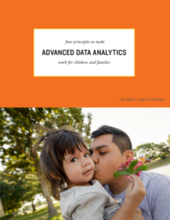Summary
Advanced analytical tools are embedded in business and government operations and, increasingly, in state and federal policy. Whether these tools benefit or harm communities depends on their design, use and oversight. Fortunately, advocates for children and families have an opportunity to shape the rapidly evolving field of advanced analytics and create frameworks that make these tools work for — not against — young people.
This brief looks at the rapid rise of advanced analytics and explores the controversies, ethical challenges and opportunities that it creates for youth- and family-serving agencies. As the document’s title suggests, it also presents four principles for identifying effective and equitable advanced analytics tools. To help illustrate these principles, the text presents real-world examples of jurisdictions using data science in ways that live up to — or fall short of — the social sector’s quest to develop better and fairer solutions for kids, families and communities.

